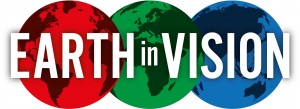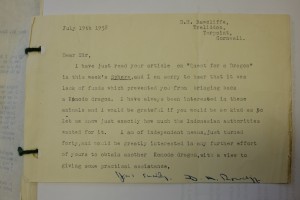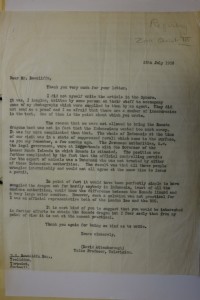Joe Smith (PI), Kim Hammond, and George Revill, The Open University

from left to right: Zdenek Zdrahal (Knowledge Media Institute), Kim Hammond, Joe Smith and George Revill (Geography Department), all at The Open University, Milton Keynes
If you can tell a good story you can change the world. That thought has motivated programme makers concerned with environment and conservation issues for decades. The Earth in Vision project aims to tell the story of the role of broadcasting, specifically of the BBC, in the emergence of a global environmental imagination. A second aim is to explore the potential for, and implications of, large scale release of digital broadcast archives.
Earth in Vision draws on the archive of environmental programming collected by the BBC since 1957: the start of International Geophysical Year, and a key date in the emergence of a global environmental imagination. The project is informed by a pilot study, which selected, annotated and cleared limited use rights for around 100 programmes; 50 hours of programming organised across 7 themes. The sample we are working with includes a mix of media and channels, and programme genres. Categories include pollution, population, climate change, resources and more.
 For those of us on the team who have worked on environmental history and politics for a while there is a great thrill in being able to knit together broadcasts, the related paper archive and, where possible, interviews with producers. In some cases we are probably the first people to watch these programmes since they were made, yet they have helped to shape the way many people think about these issues. The project will see us working to relate the original broadcasts to other material related to the productions, including paper archive files and interviews. We have filmed twenty interviews with people who contribute throughout the production process, from top producers and camera crew to film archivists and presenters. There are more interviews planned, and all of the interview material and transcripts will be made publicly accessible on the OU’s Creative Climate site.
For those of us on the team who have worked on environmental history and politics for a while there is a great thrill in being able to knit together broadcasts, the related paper archive and, where possible, interviews with producers. In some cases we are probably the first people to watch these programmes since they were made, yet they have helped to shape the way many people think about these issues. The project will see us working to relate the original broadcasts to other material related to the productions, including paper archive files and interviews. We have filmed twenty interviews with people who contribute throughout the production process, from top producers and camera crew to film archivists and presenters. There are more interviews planned, and all of the interview material and transcripts will be made publicly accessible on the OU’s Creative Climate site.
Our approach to the second strand of the work builds on principles of co-production and social learning, and aims to support more plural and dynamic accounts of environmental change. We want to think through who would use digital broadcast archives (DBAs), how they might want to use them and what tools they sense they might need. There are enormous practical obstacles to large-scale release of content produced by the BBC, above all rights and financing. But the potential is huge, and hence we are trying to think beyond the obstacles.

Letters from BBC Written Archives (Caversham) – used with permission. One way we’re linking paper archives and broadcasts. http://www.bbc.co.uk/archive/attenborough/
We expect future users to include teachers and learners, media producers, IT professionals, academics, museum curators, NGOs and activists and other publics. We are inviting samples of all of these stakeholders to participate in the project. Through tailored workshops we give participants a chance to think through anticipated digital futures and how these are relevant to them personally or professionally; to play with some of the archive content, and to explore and reflect upon their own experiences in terms of how broadcasts have influenced their engagement with or understanding of environmental issues.

David Attenborough Zoo Quest – letters for the Quest for a Dragon series (1957). These letters show a written exchange between D H Rawcliffe and David Attenborough which reveal why a Komodo dragon was not brought back for the London Zoo collection.
To support our future-thinking work on DBAs we have held workshops with: our Advisory Board; film makers and other media people at the iDocs festival in Bristol; Press Fellows at Wolfson College, Cambridge; school pupils in Milton Keynes; colleagues at The Open University’s Knowledge Management Institute; Open University students at their annual festival (who, as the UK’s most demographically diverse student population, act as ‘proxy publics’ of potential future digital citizens) and with public participants in the Belfast social sciences festival.
Among these groups it is clear that there is a strong appetite to work with DBAs, and we are gaining a sense of the ways in which people want to work with these materials, and the likely required tools. Some participants have worked with story-telling exercises that draw on samples from the BBC DBA; these have been popular and illustrate the power and creative opportunities of re-using the broadcast materials.
The rights regime around broadcast archives stands out as a central concern for those institutions that will be expected to have responsibility for, or will work with, DBAs (schools; universities; museums; media organisations). Whilst institutions such as the BBC own their own archive, many of the programmes have significant underlying third party rights (e.g. scriptwriters, actors, music etc.) which require clearance for public/specific use and can be costly. For affordable full open public access to such DBAs, some speculate on the need for a change in legislation. Alternatively, crowd funding via small download payments may be a way forward.
A clear challenge for those institutions developing DBAs is the technical development of dynamic, contextualised and user-responsive online interfaces. One of our goals is to be able to feed in citizen/learner user ambitions before technical specifications for tools are locked down. Drawing on our partners and relevant networks, we are developing an industry oriented report which will identify what the elements of a gold standard for DBAs might be. This will be pursued according to principles of co-production, where participants will be invited to feedback on drafts of the e-book and also participate in the final conference in 2016.
All of this work thinking about users, tools, rights and the nature of digital archives feels like fresh territory. But it doesn’t really rate over our starting point for the project, which is our childish excitement at having the chance to work with the broadcasts themselves. It is a great privilege to have access to sixty years of broadcast content that has helped to shape the way so many of us think about the world.
Please get in touch if you want to know more about our work, or to tell us what you or others might want to do with digital broadcast archives. Do also share any items on your wish list in relation to this potent but as yet unformed new media space.
Earth in Vision is an Open University project funded by the AHRC for 3 years form October 2013
Contact: RA and project manager kim.hammond@open.ac.uk/ 01908 274066 @kimehammond or PI joe.smith@open.ac.uk @citizenjoesmith
